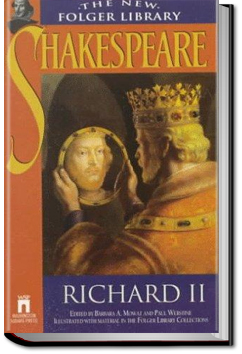

AUMERLE.
Cousin, farewell: what presence must not know,
From where you do remain let paper show.
MARSHAL.
My lord, no leave take I; for I will ride,
As far as land will let me, by your side.
GAUNT.
O! to what purpose dost thou hoard thy words,
That thou return'st no greeting to thy friends?
BOLINGBROKE.
I have too few to take my leave of you,
When the tongue's office should be prodigal
To breathe the abundant dolour of the heart.
GAUNT.
Thy grief is but thy absence for a time.
BOLINGBROKE.
Joy absent, grief is present for that time.
GAUNT.
What is six winters? They are quickly gone.
BOLINGBROKE.
To men in joy; but grief makes one hour ten.
GAUNT.
Call it a travel that thou tak'st for pleasure.
BOLINGBROKE.
My heart will sigh when I miscall it so,
Which finds it an enforced pilgrimage.
GAUNT.
The sullen passage of thy weary steps
Esteem as foil wherein thou art to set
The precious jewel of thy home return.
BOLINGBROKE.
Nay, rather, every tedious stride I make
Will but remember me what a deal of world
I wander from the jewels that I love.
Must I not serve a long apprenticehood
To foreign passages, and in the end,
Having my freedom, boast of nothing else
But that I was a journeyman to grief?
GAUNT.
All places that the eye of heaven visits
Are to a wise man ports and happy havens.
Teach thy necessity to reason thus;
There is no virtue like necessity.
Think not the king did banish thee,
But thou the king. Woe doth the heavier sit,
Where it perceives it is but faintly borne.
Go, s
Get ALL YOU CAN BOOKS absolutely FREE for 30 days. Download our FREE app and enjoy unlimited downloads of our entire library with no restrictions.
Have immediate access and unlimited downloads to over 200,000 books, courses, podcasts, and more with no restrictions.
Everything you download during your trial is yours to keep and enjoy for free, even if you cancel during the trial. Cancel Anytime. No risk. No obligations.
For just $24.99 per month, you can continue to have unlimited access to our entire library. To put that into perspective, most other services charge the same amount for just one book!

As avid readers, we understand the joy of immersing ourselves in a captivating story or getting lost in the pages of a good book. That's why we founded All You Can Books back in 2010, to create a platform where people can access an extensive library of quality content and discover new favorites.
Since our founding days, we’ve continuously added to our vast library and currently have over 200,000 titles, including ebooks, audiobooks, language learning courses, podcasts, bestseller summaries, travel books, and more! Our goal at All You Can Books is to ensure we have something for everyone.
Join our community of book lovers and explore the world of literature and beyond!
For the first time, Shakespeare creates a compelling historical protagonist who speaks naturally in a poetic voice that is distinctively his own. In his earlier works involving kings and emperors, Shakespeare imitated Marlowe's "mighty line" with some--if not complete--success (Richard III was inher